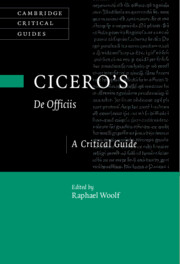Book contents
- Cicero’s De Officiis
- Cambridge Critical Guides
- Cicero’s De Officiis
- Copyright page
- Contents
- Contributors
- Acknowledgements
- Abbreviations
- Introduction
- Part I The Framework of De Officiis
- Part II The Role of Virtue
- Part III Exemplary Ethics
- Part IV Self and Society
- Part V Politics
- 10 Patriotism and Cosmopolitanism in Cicero’s De Officiis
- 11 Cicero’s Extremist Ethics
- References
- Index
- Cambridge Critical Guides
10 - Patriotism and Cosmopolitanism in Cicero’s De Officiis
from Part V - Politics
Published online by Cambridge University Press: 15 June 2023
- Cicero’s De Officiis
- Cambridge Critical Guides
- Cicero’s De Officiis
- Copyright page
- Contents
- Contributors
- Acknowledgements
- Abbreviations
- Introduction
- Part I The Framework of De Officiis
- Part II The Role of Virtue
- Part III Exemplary Ethics
- Part IV Self and Society
- Part V Politics
- 10 Patriotism and Cosmopolitanism in Cicero’s De Officiis
- 11 Cicero’s Extremist Ethics
- References
- Index
- Cambridge Critical Guides
Summary
Cicero’s De Officiis is a foundational text for two important but seemingly opposed traditions in the history of political thought: republicanism and cosmopolitanism. The former regards the res publica as the proper object of its citizens’ highest allegiance and patriotism as an indispensable virtue; the latter holds that one’s greatest allegiance should be to a notional world community of all human beings. Scholars usually regard Cicero’s strong commitment to the res publica as the product of his unreflective Roman patriotism, which is necessarily at odds with his cosmopolitan account of justice. In contrast, I argue that Cicero offers philosophical arguments for the priority of the res publica that derive from the same Stoic account of sociability that grounds his cosmopolitanism. De Officiis therefore presents a coherent account of what we might call “patriotic cosmopolitanism.” The chapter explicates Cicero’s argument for patriotic cosmopolitanism, draws attention to its theoretical strengths, and considers three important philosophical criticisms and how Cicero might respond.
- Type
- Chapter
- Information
- Cicero's ‘De Officiis'A Critical Guide, pp. 203 - 223Publisher: Cambridge University PressPrint publication year: 2023
- 3
- Cited by

